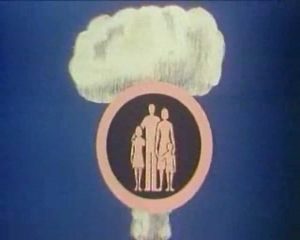An important part of our work in the Advice and Records Knowledge department is answering questions from the public regarding the records we hold here at The National Archives. In what we call ‘specialist referrals’ questions are filtered through to the staff member with the most appropriate specialism to answer, who will use their knowledge of the records and the context around them to respond as accurately as possible.
An enquiry came my way recently regarding the ‘Protect and Survive’ leaflets that were distributed by the government during the 1970s and 1980s in order to provide advice to members of the public should Britain be subject to a nuclear attack. I directed the enquirer towards some original documents – INF 6/2294, INF 6/2502, and INF 6/2531 – but my colleague suggested I take a look in the archive of public information films available on our website.
To celebrate the 60th anniversary of the creation of the Central Office of Information (COI) in 2006, a selection of some of their most memorable films were added to our website. Indeed, amongst those are two made in 1975 relating to the ‘Protect and Survive’ series: one entitled ‘Action After Warnings’, the other ‘Casualties’.

Protect and Survive - public information films released in 1975
So, in the week following the closure of the COI I thought I might pick out five of my favourites:
- First, the humorous ‘Coughs and Sneezes’ (1945) advises serial sneezers to increase their use of handkerchiefs.
- The late television and radio presenter Jimmy Savile educates viewers in road safety in the shocking ‘Clunk Click – Shopping with Jimmy Savile’ (1972).
- Also on the subject of road safety, Dave Prowse assumes the role of the Green Cross Code man in what was – and remains to this day – his most famous acting role. In this one, our hero is joined by a robot companion (1975).
- One of the most hard-hitting films is the 1987 campaign informing the public to ignore the far-too widely held misconception that AIDS is a disease that only affects certain groups, with the slogan: ‘AIDS: Don’t Die of Ignorance’.
- Finally, the 2003 campaign advising children to ‘Tell Someone’ is remarkable both its emotional impact and the simplicity of its message.
The responsibility for making public information films will now lie with individual departments – such as the current Department of Health campaign warning of the dangers of secondhand smoke – ensuring that important messages are passed on to the public in an effective way. Indeed, while some of the statistics – road traffic casualties fell by three quarters between the 1970s and 2000s – indicate the success of these videos, they also require regular refreshment, with several new campaigns for each generation.
Since the closure of the COI the public information films themselves have been transferred to the BFI National Archive for preservation and will be presented to the public via a number of platforms, so they will continue to be useful educational and historical resources for generations to come. And keep the questions about your research coming in to us: you never know what kind of record you might end up seeing.
Thought you might like to see my short film, ‘Disinfection’, based on the P&S series.
http://vimeo.com/37303020
Hi Chris,
Thanks very much for that, a very nicely made video. I’ll be sure to listen out for the initial siren blast. 😉
Simon